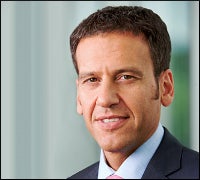 |
| Hamid Akhavan Source: Deutsche Telekom |
There was a time — not all that long ago — when the telecom industry was all about voice communications with a simple telephone.
That’s no longer the case, and it’s creating both huge headaches and major opportunities for carriers and consumers, according to Hamid Akhavan, chief operating officer of Deutsche Telekom.
In a keynote at the Supercomm conference, Akhavan said that the modern telecom industry is now the collision of what used to be three separate industries, and its expansion beyond just voice is having tremendous impact on the industry as well as the lives of hundreds of millions of consumers around the globe.
“What used to be called telecommunications is now computing and Internet and also consumer electronics,” Akhavan said. “This is posing a significant amount of challenges and opportunities for us and that’s the essence of telecom today.”
Deutsche Telekom Group (NYSE: DT) is one of the world’s largest telecom vendors, and in the U.S. is perhaps best known for its T-Mobile wireless division. For Akhavan, the current state of telecom means that his company now spends time working on operating systems, hardware and user interfaces for consumer devices.
“These industries coming together is not by invitation, it was not planned — it is literally a collision of three industries,” Akhavan said. “These are three industries that are each trying to expand their customer bases and scale. The three industries colliding are causing enormous amounts of complexity.”
From the carrier point of view, Akhavan said that the customer support training manuals at Deutsche Telekom are updated now at a rapid rate to better keep pace with new technology and new developments.
The rapid rate of innovation and mixing of consumer electronics, Internet and traditional voice has also led to an erosion of profit margins and is making it more difficult to scale up the entire business, he said.
Downsides for end-users — and solutions
Akhavan warned that the added complexity of modern telecom is being passed on to consumers, making it more difficult for them to connect all the various pieces together.
He suggested to the Supercomm audience that what telecom vendors should do today is simplify technology and integration wherever possible, creating value for customers.
One approach that Deutsche Telekom is taking is its effort to be more focused on users’ connected lives and work environments. Akhavan said that as a result of digitalization, users need to manage and organize content no matter where it is, and they need to integrate that content across the multiple devices and screens that they own.
Digital life storage is also required in order to protect all of a user’s digital assets regardless of what device the content was originally created on.
“The mark of quality these days is simplicity,” Akhavan said. “The way to win is to collaborate on innovation.”
Akhavan added that customers just want products to work well together, regardless of where they came from. And he said that there is a constant demand for new functionality in technology that telecom vendors must deliver.
“Customers always want more, but what they don’t want is it so poorly put together such that the additional functionality gets in the way of usability,” Akhavan said.
For Akhavan, there is money to be made in simplification and in helping users to manage and enable their digital lives.
“What we have seen in the last ten years, in terms of a revolution in telecom, is not the end of this industry — rather, it’s just the beginning of the next phase,” Akhavan said. “The revolution will continue.”


